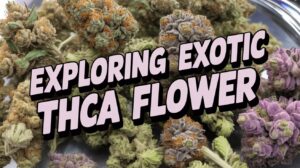key points
Hemp has come a long way since the days of your college buddy showing off his “fire” stash in a ziplock bag. These days, we’re not just talking about THC or CBD. Cannabis science has gone wild—and there’s a new cannabinoid on the block that’s making headlines for how insanely strong it is. It’s called THCP (tetrahydrocannabiphorol), and let me just say: THC suddenly feels like the baby version.
I’m not new to cannabis. I’ve tried everything from THC-infused teas to full-spectrum CBD oils. But when I heard about THCP, I was skeptical. People online were calling it “THC on steroids” and claiming it was up to 33 times more potent. Naturally, I had to see what the hype was all about. Spoiler alert: It hit way different.
Let’s talk about what happened when I tried it—and the science behind why this cannabinoid might be the future (or at least, the freaky cousin) of modern weed.
First, What the Heck Is THCP?
So, THCP was discovered in 2019 by a team of Italian researchers. They published their findings in the Scientific Reports Journal and shook up the cannabis world. Until then, we thought THC was the most potent naturally occurring cannabinoid. Then came THCP, which binds to our CB1 receptors (the part of the brain that gives you that classic high) 33 times more strongly than THC. Yeah, 33 times.

“We found that THCP has a binding affinity for CB1 receptors that is much higher than that of THC, which likely explains its extreme potency.”
— Cannazza, et al., 2019, Scientific Reports
To put that in perspective: if Delta-9 THC is a knock on your brain’s door, THCP is basically kicking it down with steel-toed boots.
THCP occurs naturally in cannabis, but only in trace amounts. That means most of what’s on the market is lab-extracted or synthetically derived—especially in vape pens, tinctures, or gummies.
How It Works (in Plain English)
Let me break down the nerdy stuff real quick.
Every cannabinoid has a molecular “tail”—a chain of carbon atoms. THC has five carbon atoms in its tail. THCP has seven. That little change makes a big difference. The longer tail allows THCP to bind more effectively to CB1 receptors in your endocannabinoid system, which control things like mood, aches and soreness, appetite, and perception.
In short: THCP activates your brain’s cannabinoid receptors more efficiently than THC, giving it more intense psychoactive effects.
But here’s where it gets tricky: just because it binds stronger doesn’t mean the high is 33 times stronger. It means it can be, depending on dosage, tolerance, and your body’s chemistry. So if you’re thinking of taking the same amount as you do with THC… don’t.
Legal Status of THCP
The legal landscape for cannabinoids like THCP is complex and varies by jurisdiction. In the United States, the 2018 Farm Bill legalized hemp-derived products containing less than 0.3% Delta-9 THC.
Since THCP can be derived from hemp, it occupies a gray area in federal law. Some interpretations suggest that THCP is legal under this bill, while others argue that its psychoactive nature and synthetic production methods place it outside the bill’s protections. Additionally, state laws differ significantly, with some states explicitly banning or regulating cannabinoids like THCP.
Personal Experience: Trying THCP for the First Time
I tried a THCP disposable vape pen that had 2mg of THCP in it. For context, that’s a very small amount—but keep in mind, this isn’t your average Delta-8 puff.
I took one hit.
At first, nothing happened. About 20 minutes in, I felt a warm sensation in my chest and a noticeable shift in perception. My thoughts slowed down, sounds became sharper, and I felt this heavy wave of euphoria. But not in a giggly, happy way—it was more introspective, almost meditative. I wasn’t couch-locked, but I definitely wasn’t going anywhere.
By the 40-minute mark, I was deep. Time felt elastic. Music sounded like it was being played inside my brain. I didn’t feel paranoid, but it wasn’t the carefree high THC usually gives me. This was stronger, heavier, and much longer-lasting. The whole experience lasted a solid 6–8 hours, with a very slow come-down.
Honestly? It felt like weed, mushrooms, and meditation all had a baby. And that baby was intense.
Physical and Cognitive Effects
I felt incredibly relaxed, even sedative, on a physical level. The term “couch-lock” is commonly used by cannabis users to describe a strong need to be seated or reclined, and it accurately describes how I felt.
My mind was more sensitive. Although I wasn’t nervous, I can see why some individuals, particularly THC paranoia-sensitive people, would find THCP’s impacts too potent. If one is just trying THCP for the first time and in a secure environment, newcomers have to be careful.
Side Effects
The side effects I encountered were consistent with those commonly associated with potent THC products: dry mouth, red eyes, and increased appetite. However, these were more pronounced than what I typically experience with Delta-9 THC. Staying hydrated and having snacks on hand helped mitigate these effects.
So that’s why I believe that this isn’t a casual, “let’s microdose and watch Netflix” kind of high. If you’re new to cannabis, don’t start with THCP. Even regular users should proceed with caution.
Comparing THCP to Other Cannabinoids
If Delta-9 is your party animal friend, THCP is the crazy artist who is into quantum physics and doesn’t play games with small talk. It’s not everyone’s favorite cup of tea—but it does have its place.
Let’s take a look:
| Cannabinoid | Potency | Psychoactive? | Common Use |
| CBD | Low | No | Anxiety, physical relief |
| Delta-8 | Mild | Yes (mild) | Relaxation, appetite |
| Delta-9 (THC) | High | Yes | Euphoria, creativity, medical use |
| THCP | Very High | Yes (intense) | Physical relief, sedation, introspection |
To contextualize THCP’s potency, it’s helpful to compare it to other cannabinoids:

Delta-9 THC: The standard psychoactive component in cannabis, known for its euphoric effects.
Delta-8 THC: Typically termed as a less potent version of Delta-9 THC, with similar but weaker effects.
THCP: 33 times more effective at binding to CB1 receptors than Delta-9 THC, with effects estimated to be 3 to 5 times stronger.
This similarity shines light on THCP’s unique place as one of the strongest cannabinoids, which requires caution regarding dosage and application..
Safety Considerations and Recommendations
Given THCP’s increased strength, it’s essential to proceed with responsible use:
Start Low and Go Slow:
Start with a low dose to gauge your body’s response before contemplating an increase.
Choose a Safe Environment:
Use THCP in a relaxed and familiar environment to limit any possible anxiety or unease.
Stay Hydrated:
Have water available to counteract dry mouth and remain hydrated during the experience.
Avoid Driving or Operating Machinery
Because of the power of THCP and how hard it hits, it’s best that you avoid whatever requires total mental attention, such as driving or operating machinery, until you’re aware of how it affects you personally. The psychoactive effect may be overwhelming, so caution always has to come first.
Consider Your Tolerance:
If you’re a beginner with cannabinoids or have low cannabinoid tolerance, you should be careful with THCP. Experienced individuals might be able to handle the effects better, but even chronic cannabis users should be careful with the potency of THCP. Keep in mind that every body reacts differently to cannabinoids.
Consult a Professional if Needed:
Unless you know exactly how THCP can impact your medication or current health conditions, it’s always safest to consult a doctor. With THCP being a new compound, research on its long-term effects is still ongoing and it’s safe to learn how it can impact you as an individual.
The Future of THCP: What’s Coming Next?
With continued research into THCP, the cannabinoid’s potential for medicinal and recreational uses remains a matter of fiery controversy. More about its full gamut of effects and comparison with other cannabinoids like CBD, Delta-9 THC, and even CBG (Cannabigerol) is still being learned by scientists. The unique mechanism of THCP binding at CB1 receptors opens doors for future therapeutic applications, namely to those seeking increased effects from cannabis.
Medicinal Potential:
While the potency of THCP is certainly one of the most typical characteristics, it can also have a place in medical cannabis therapy. With its strong binding affinity with CB1 receptors, it could be used to treat physical aches and discomfort, inflammation, and even certain mental disorders. Its effects could be best suited for patients who have become tolerant to other cannabinoids, or those seeking more potent relief from their symptoms.
Research and Regulation:
Now, the legal status of THCP is uncertain, and more studies will be necessary to determine how it fits into cannabis laws around the world. As stronger cannabinoids become increasingly popular, legislators may begin to examine THCP in more detail, potentially leading to regulation or specification of its legality in the future.
Researchers will also proceed to explore the therapeutic uses of THCP, including whether or not it possesses specific benefits compared to other cannabinoids like Delta-9 THC and CBD. Scientists are sure that THCP has the ability to cure ailments like chronic discomfort, loss of appetite, and even anxiety because it is highly effective and specific at binding to some receptors.
The Bottom Line: Is THCP Worth It?
Having tried THCP myself, I can confirm that it is a much more potent, longer-lasting high than normal Delta-9 THC. If you’re an old hand with cannabis, THCP can provide you with an added kick and pleasure. But if you’re a newcomer to cannabis or don’t want such a powerful high, THCP is not for you. Its potency will render it unacceptable to everyone, and safety measures will be necessary as far as application is concerned.
To perform the experiment using THCP, this is what I recommend:
Gradually approach it: Start very low dose-wise, particularly if you’re low-tolerant or new to it. Sneaking up on dosages is possible any time; starting low will at least allow you to experiment and see how your system responds.
Consider a relaxed environment: Keep THCP in a comfortable, secure environment where you actually feel it. You simply need to feel at ease and allow it to run its course as it should.
Plan your day: Remember that the effects of THCP take time to develop, so ensure you do not have any other complicated plans for the rest of the day. It’s not a kind of high you’ll be eager to rush through. There is buzz about THCP, and it’s certainly a cannabinoid worth watching as more is learned about it. Whether or not it “makes THC look weak” will have to wait and see, but this much is certain: THCP is a potent and strange molecule that’s rewriting the cannabis textbook.
Recommended products
-
Delta-9 THC Gummies with THCp + CBG – 52mg Each
Price range: $32.97 through $74.97In stock
-
Delta-9 THC Gummies with THCp + CBN – 52mg Each
Price range: $32.97 through $74.97In stock
If you’re looking for something a bit stronger, then THCP may be an option to consider trying out. But with any new potent cannabinoid, just be sure not to overindulge and be careful.
Final Thoughts: The New High-Potency Cannabinoid
Even though THCP is new to going mainstream, already it’s showing great potential when you consider how strong it is and what type of effects it can have. Thanks to the new chemical compound, THCP is better able to bind itself to CB1 receptors, having a much greater effect than normal THC. This is wonderful news for legal users but also traditional cannabis users who may be able to feel an even greater effect.
From my experience, THCP created a much stronger, longer-lasting high that I have had with Delta-9 THC. It was an interesting, captivating experience but also one to remind me quite strongly of how careful we have to be when we do use this cannabinoid. If you are an adult, recreational cannabis user, or even new to cannabinoids, THCP is well worth trying but always responsibly and sensitively.
Keep in mind that every individual’s experience with cannabinoids is different, so if you’re interested in THCP, go slow and enjoy the ride!

Legal Disclaimer:
By reading this information presented, you agree to release the author of any liability that comes from using this data. This post contains no legal advice. Claims about cannabinoids have not yet been approved by the FDA. Read the full legal disclaimer here.
More Articles About Cannabis:
- What Is THCA Cannabinoid? A Beginners Guide!
- Understanding THCA Drug Tests and How to Avoid Failing
- THCA VS Delta-8 THC! What Are The Differences?
- Where to Buy Wholesale High THCa Flower
- How to Find the Best THCa Flower Online
- Bulk THCa: Buying THCa Flower By The Pound
References:
- Cannazza, G., et al. (2019). A novel phytocannabinoid isolated from Cannabis sativa L. with an in vivo cannabimimetic activity higher than Δ9-tetrahydrocannabinol: Δ9-Tetrahydrocannabiphorol. Scientific Reports. https://www.nature.com/articles/s41598-019-56785-1
- Leafly. (2023). What is THCP, and how strong is it? https://www.leafly.com/news/strains-products/want-to-try-hot-new-cannabinoids-like-delta-10-thcp-it-pays-to-have-a-friend-like-bay-smokes
- ACS Laboratory. (2022). The Science Behind THCP and Its Potency: https://www.acslab.com/cannabinoids/comparing-exotic-cannabinoids
- https://www.addictioncenter.com/news/2020/03/scientists-discover-a-cannabinoid-more-potent-than-thc/#:~:text=The%20Italian%20study%20has%20made,is%20more%20potent%20than%20THC.
- https://everydaydelta.com/blogs/education/thc-p-vs-thc-v-exploring-the-differences-and-effects?srsltid=AfmBOoryp2YFCaDMqYr2zPHx0Vw_DjRvmr2YxFIMZPdwU8P44jwdAxc5
- https://imperialextraction.com/blog/how-strong-is-thcp/
- https://www.psnet.biz/post/what-is-thcp-is-it-stronger-than-thc
FAQs About THCP
THCP is a powerful cannabinoid discovered in 2019, much stronger than Delta-9 THC.
THCP exists in a legal gray area; it may be legal if hemp-derived, but state laws vary.
THCP delivers a deeper, longer, and more introspective high than regular THC.
Not recommended. Even experienced users should start with a very low dose.
Dry mouth, red eyes, increased appetite—similar to THC but often more intense.









